Trewithen Regenerative Farming
All natural, 100% pure Cornish milk, from family farms leading the way in regenerative CO2 reducing farming practices. Cherishing our soil, boosting biodiversity so cows can graze freely on a rich variety of plants. Its farming in harmony with nature. We are incredibly excited by this as it has been in the making since 2020.
What is regenerative farming?
Regenerative farming is an agricultural approach focused on improving and revitalising soil health, biodiversity, water cycles, and ecosystem resilience. We set out five principles of Regenerative farming below:
Diversity
Diverse cropping systems enhance soil functions, improve resilience to changing conditions, and support belowground biodiversity. More plant variety increases soil pore networks and boosts water retention.
Protect Soil Surface
Keeping plant cover or residue on the soil protects it from erosion and damage. It also promotes better soil structure by supporting soil biota (organisations that live in the soil), which improve water infiltration and gas exchange.
Maintain Living Roots
Plants are essential for soil health, as they provide energy to the soil ecosystem. Maintaining living roots helps store carbon, fosters beneficial fungi (mycorrhizae), and improves nutrient uptake.
Minimise Soil Disturbance
Soil functions optimally when its structure is undisturbed. Minimising tillage helps preserve soil pore connectivity, water movement, and organic matter, promoting healthy soil ecosystems.
Livestock Integration
Grazing animals play a key role in nutrient cycling. Managed carefully, they can enhance soil health through manure fertilisation and minimal soil disturbance, aligning with natural ecosystem processes.
What do our farmers do?
Our farmers are leading the way in regenerative farming practices that help reduce carbon emissions and promote long-term sustainability. At least 25% of their temporary grasslands contain a minimum of four sown species, and dairy cows are rotated to fresh pasture every five days to enhance soil health. By incorporating clover in all grasslands, our farmers naturally fix nitrogen, significantly reducing the need for artificial fertilisers.
To maintain healthier soils, no more than 25% of the land is ploughed each year, with a maximum depth of 20cm, while the rest is cultivated using minimal tillage or direct drilling. Organic matter is frequently added to boost soil vitality, and living roots are kept in the ground year-round, with a brief 3-week gap for crop or grass establishment. Our farmers are also proactive in reducing antibiotic use to ensure healthier livestock and ecosystems.
Social sustainability is a key in our approach. Every farmer is on their own regenerative journey, supported by ongoing education and knowledge sharing. These are family-run farms, making their own decisions, and committed to shared goals like avoiding palm oil and imported soya.
This collaboration fosters economic sustainability, new opportunities, and better mental health for the farming community. Its win for the farmers, the farms, and our planet!
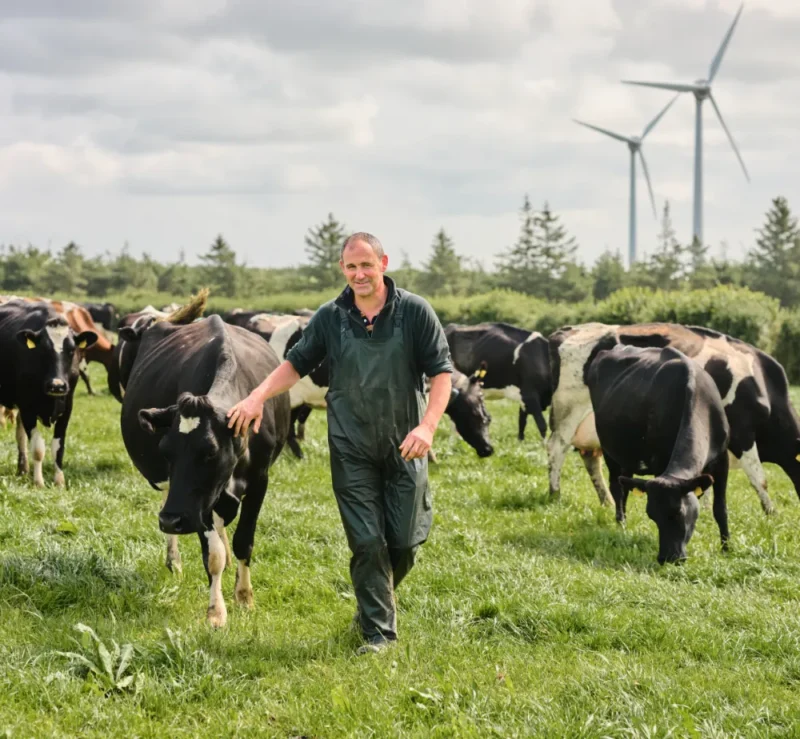
How we measure our claims on pack
Carbon Reducing
All natural, 100% pure Cornish milk, from family farms leading the way in regenerative CO2 reducing farming practices. Cherishing our soil, boosting biodiversity so cows can graze freely on a rich variety of plants. Its farming in harmony with nature.
One Natural Ingredient
100% pure Cornish milk, with nothing added – no additives, thickeners, or gums like you’d find in many plant-based additives. Just pure, natural goodness.
Boosts Diversity
Clover acts as a natural nitrogen fixer, and all fields feature at least three plant species. A quarter of grasslands boast a mix of four or more species, and new hedgerows will include at least ten different species. By maintaining living roots and minimising disturbance, we encourage a healthy, diverse ecosystem.
Positive Environmental Impact
We limit ploughing to 25% or less of the land annually, at a shallow depth of 20cm. By regularly adding organic matter to the soil, we keep it healthy and fertile. Plus, we work to improve water quality by supporting soil health.
Cows Free to Graze
Our cows enjoy at least 120 days a year grazing outdoors, meeting the highest standards for pasture-based farming.
An Extra +5p to Farmers:
We’re giving back! For every litre sold, farmers receive an additional 5p to support their continuous efforts in pioneering sustainable farming methods.
what is our Grazed milk?
Ever since the original founders the Clarke family started dairy farming, back in 1976, they were driven by the goal of crafting of delicious dairy products, whilst also caring deeply about the land and the local area.
All these years later, we’re still obsessed with creating healthy pastures to nurture the soil under our cows hooves, we care deeply about the welfare of our herds and we’d do anything to encourage bumblebees and butterflies.
We believe that with great dairy comes great responsibility, so we created the ‘Trew Farming Philosophy’ and Trew Standards which is a code of our shared practices and beliefs.
Building upon these Trew Standards, we started to work closely with two farms who have adopted regenerative farming techniques. This has two main outcomes – it sequesters carbon into the soil and increases biodiversity.
The two farms were so pleased with benefits this farming practice was delivering, that last year we have had another four farms come on board. This was huge for us and means that we have a large enough volume of milk to now turn into a product for you to buy!
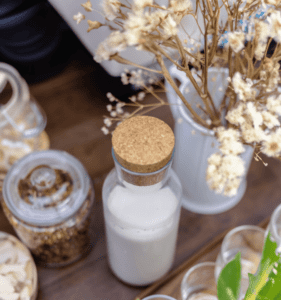
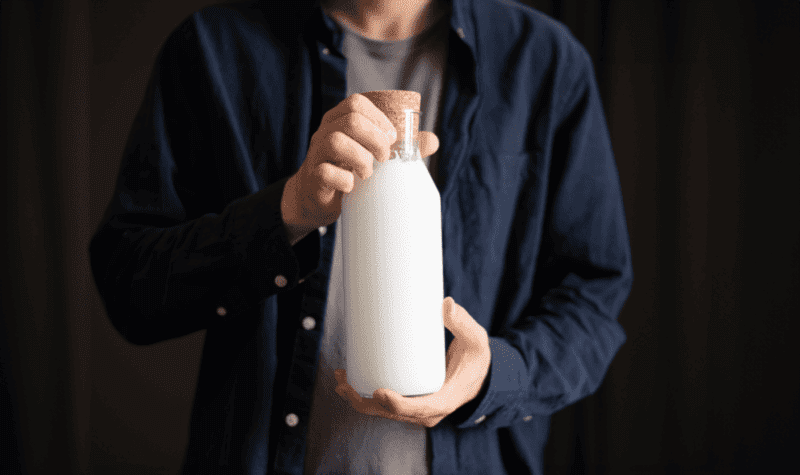

Meet our regen farmers
Peter & Sheila Cox
Mearfield Farm- 200 acres in glorious South East Cornwall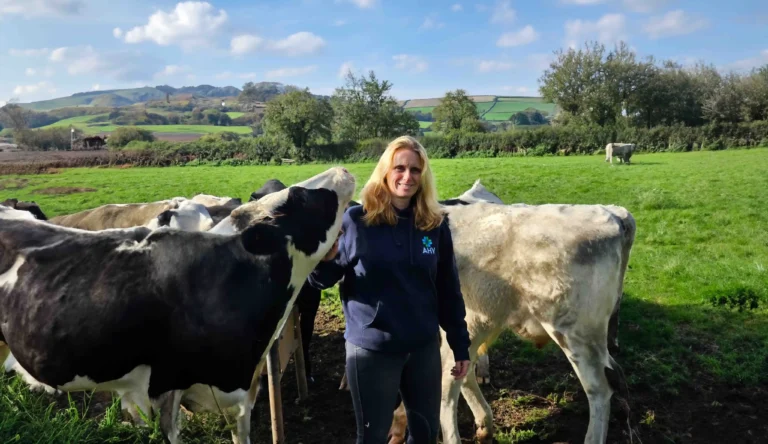
The Kent Family
Polventon Farm, overlooking the Fowey River near St Neot.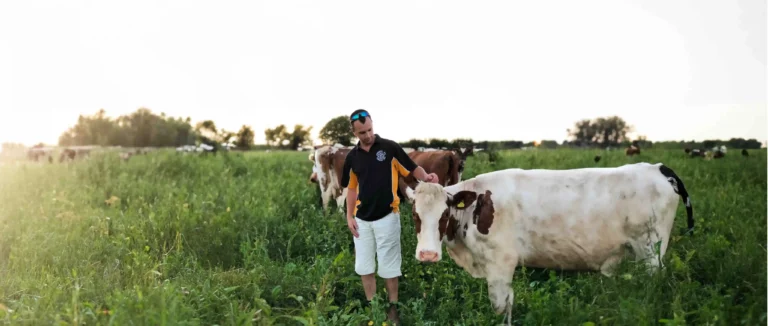
Chris Tucker
Arrallas Farm, on the edge of a beautiful, wooded valley near Ladock, Truro.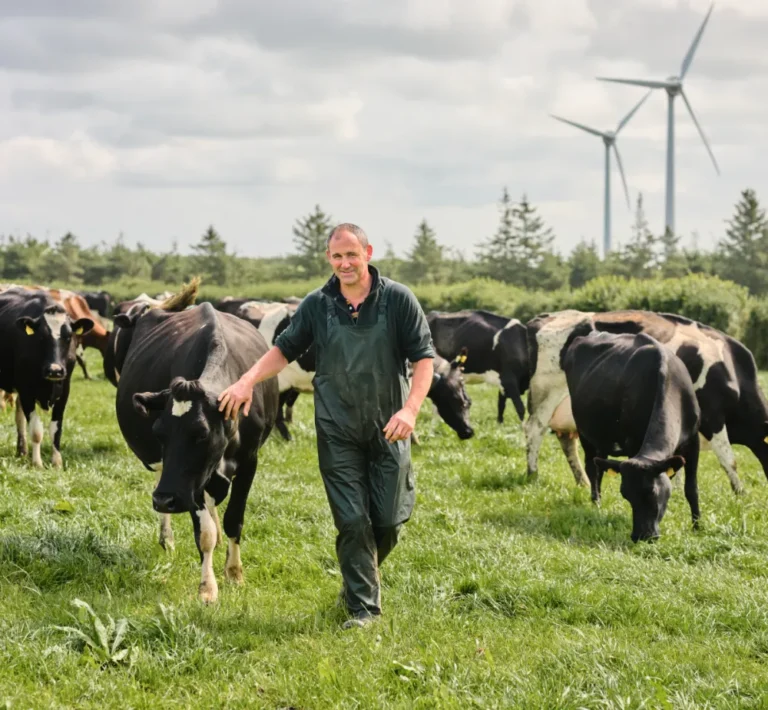
The Whell Family
Leyonne Farm, based near Fowey with a herd of 400 cows.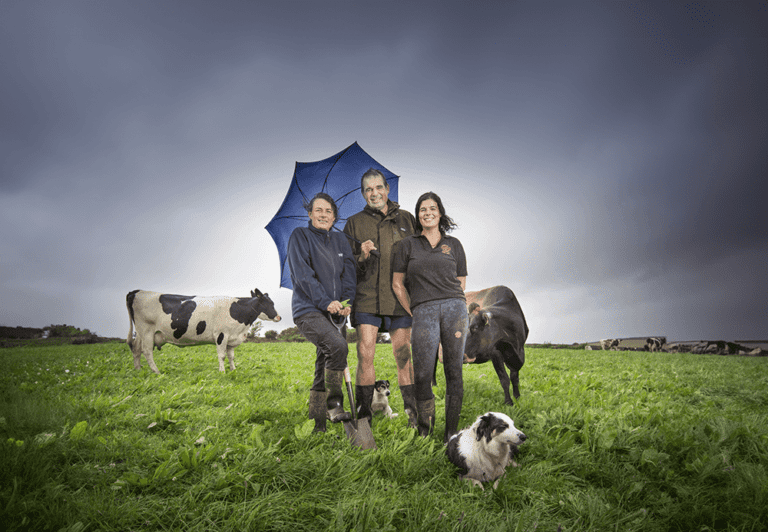
Matthew Rowe
Tredinnick Farm, situated less than 20 minutes from Trewithen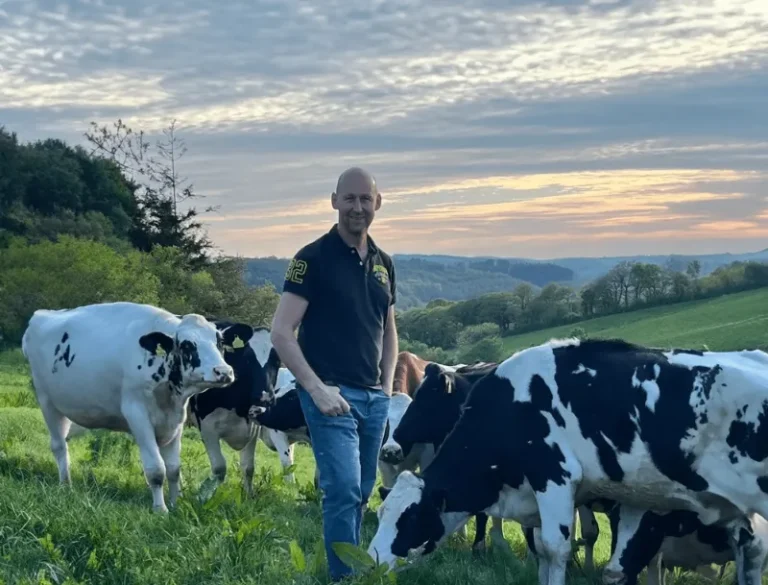
JJ & Kiki Willcocks
Tregleath Farm, located between Bodmin and Wadebridge on the edge of the Camel Valley.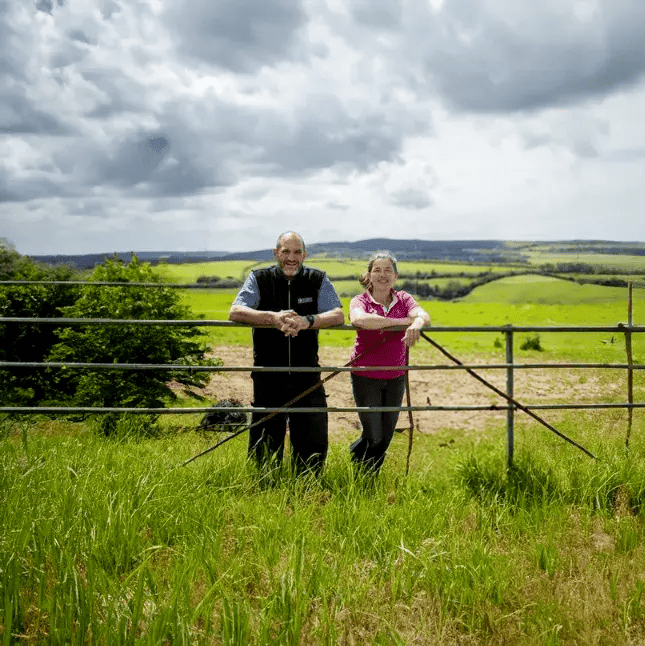
FAQs
What is regenerative farming?
Regenerative farming is an agricultural approach focused on improving and revitalising soil health, biodiversity, water cycles, and ecosystem resilience. It emphasises practices like cover cropping, reduced tillage, rotational grazing, and agroforestry to restore the natural functions of the land. The goal is to enhance the land’s ability to sequester carbon, improve soil structure, and increase crop yield over time, while also benefiting the surrounding environment and communities.
What is regeneration in the dairy industry?
Regeneration in the dairy industry involves implementing farming practices that improve soil health, enhance biodiversity, and reduce the environmental footprint of dairy farming. This can include rotational grazing, which allows pastures time to recover and regenerate, improving soil fertility and carbon capture. Additionally, it focuses on sustainable water management, reducing greenhouse gas emissions, and continuing with our high Trew Standards husbandry practices.
Is regenerative better than organic?
Regenerative farming and organic farming have overlapping goals, but they are not identical. Organic farming focuses on eliminating synthetic pesticides and fertilisers, while regenerative farming prioritises restoring soil health and ecosystem functions. Some argue that regenerative practices can have a broader positive impact on the environment, including better soil structure and increased biodiversity. However, organic farming is strictly regulated, ensuring no synthetic inputs, whereas regenerative practices may vary. The best choice depends on specific goals—whether prioritising chemical-free production or broader ecological benefits.
What does regenerative mean in food?
In the context of food, “regenerative” refers to the production methods that aim to restore and enhance the health of the soil, environment, and communities where food is grown. It means that the food has been produced using farming practices that go beyond sustainability, actively working to regenerate and improve soil health, reduce carbon emissions, and increase biodiversity. Regenerative food production seeks to create a positive impact, making farming ecosystems more resilient and ensuring that the land is healthier for future generations.
What does ‘Regen’ Milk mean?
Regen Milk is our new milk produced using regenerative farming techniques, which focus on working in harmony with nature. While the farming practices has different techniques, it’s still the same delicious milk you know and love, available across the South West.
How does Regen Milk help restore the environment, and why is it important for our future?
By practicing regenerative farming, we help the land heal and thrive. This method of farming focuses on creating a balanced ecosystem where nature and farming support each other. It’s essential for the future because it aims to leave the land better for the next generation.
How does Regen Milk boost biodiversity?
Regenerative farming creates a welcoming environment for wildlife by enhancing soil health and promoting a variety of plant and animal species. It’s all about fostering life and diversity on the farm, which benefits everything from bees to birds. Farms focus on hedgerow management, planting more species, and careful livestock integration.
How does Regen Milk reduce CO₂ emissions?
Our farming practices are designed to capture more carbon in the soil and reduce emissions. By managing the land thoughtfully and using fewer artificial inputs, we help limit the farm’s carbon footprint, contributing to a healthier atmosphere. You may have heard the term carbon sequestration this is what regenerative farming encourages removing more carbon from the atmosphere and locking it in the soils.
What are some examples of regenerative farming techniques, and why do they matter to the milk I buy?
Techniques include rotating crops, planting cover crops, and avoiding chemical pesticides. These practices improve the soil naturally, meaning cows are fed healthier food, and the milk remains fresh and nutritious. We also practice mob grazing, where you mimic natural grazing of herd animals moving them often into new fields, it’s great for the cows and great for the soil. It’s important because healthier land supports better food, now and in the future.
Why is there an extra 5p for farmers, and how does it support them?
This extra support helps farmers cover essential costs like trials for new techniques, special seeds, and additional management efforts—all without relying on grants. It ensures they can continue these important practices and grow even more resilient farms. We are on journey and what we do today will continue to develop as we learn and develop new techniques. The regenerative farming community is growing and sharing best practices is encouraged.
What exactly are you testing on the farms?
We test several key aspects, such as:
– Soil health through organic mass and carbon levels.
– Farm-wide carbon emissions with the Farm Carbon Tool Kit.
– Diversity of plant species.
– Soil pH and nutrient levels.
Each test gives us a snapshot of the farm’s environmental health and sustainability.
How do you measure regenerative farming success?
We’ve developed our own regenerative farming standards, and each farm is audited yearly to ensure they meet these guidelines. It’s a hands-on way to verify that the farm is continually improving.
How do you ensure it’s actually regenerating the soils and local environment?
We review test results against set benchmarks and adjust based on farm size and practices. By sharing best practices and checking our standards, we make sure each farm keeps making progress.
Who are you working with on this project?
Farm Carbon Tool Kit helps us analyse data, work with farmers to apply results, and run meetings focused on regenerative practices tailored to each farm.
Terra Farmers completes the soil testing and collects samples at different depths to understand soil health at every level.
How many farmers are regenerative farming:
We have 6 farms who are regenerative farming.
Why are not all your farms regenerative farms?
All our farmers apply to our Trew Standards that are higher standards than standard! All our farms family owned and take huge care of their cattle and farms. Regenerative farming is different approach and it’s not for all at this moment. That isn’t to say its wrong, each farm is different.